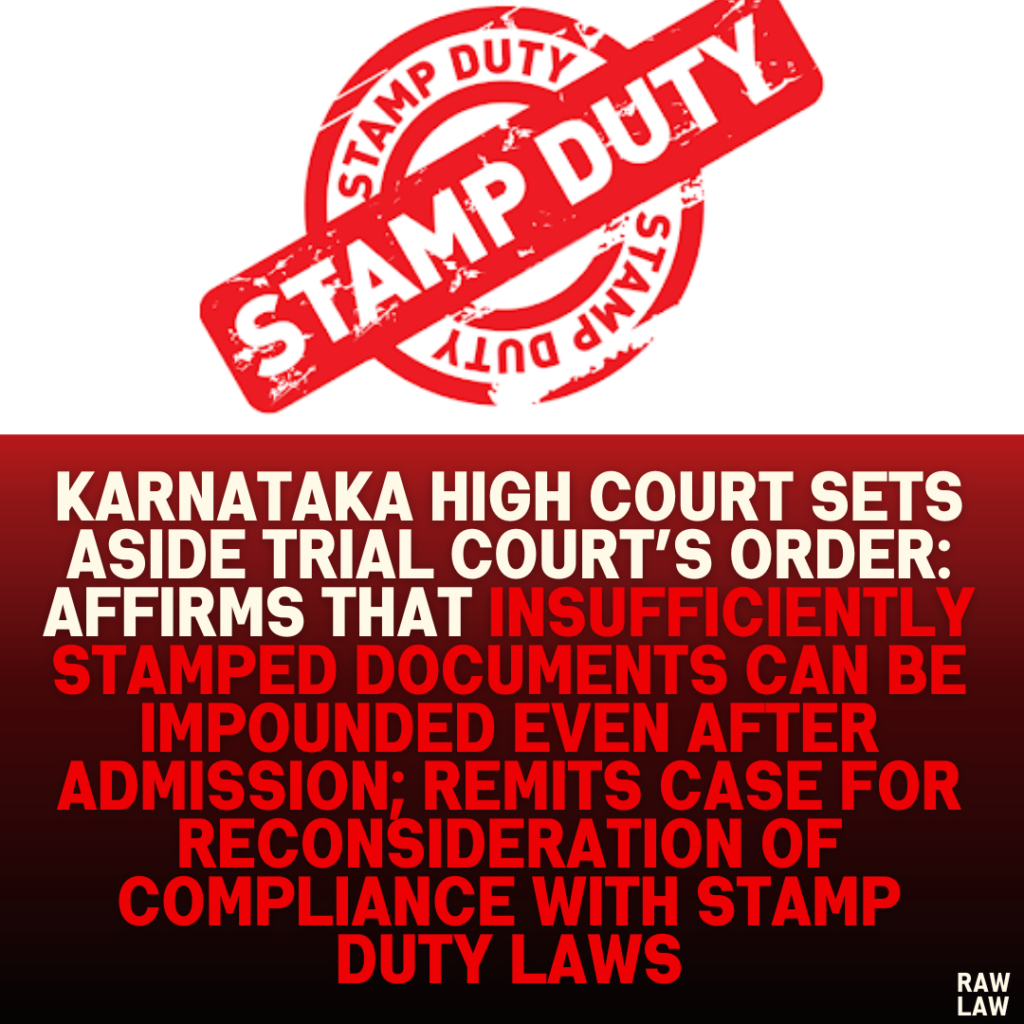Court’s Decision:
The Karnataka High Court allowed the writ petition filed by the defendant, challenging the Trial Court’s order that had dismissed their application to impound certain documents (release deeds). The High Court set aside the Trial Court’s decision and directed the Trial Court to reconsider the application (I.A. No. 13) and decide the matter after hearing both parties. The court clarified that insufficiently stamped documents can be impounded even if they were admitted as evidence without objection.
Facts:
- The case involved a suit filed by the plaintiffs seeking a declaration that a sale deed dated 19.10.2012, executed by defendant No. 1 as a General Power of Attorney (GPA) holder, was null and void.
- During the trial, the plaintiffs marked three release deeds (Exhibits P-35, P-36, and P-37) as evidence without any objection from the defendants.
- After the documents were marked, the defendants filed an application (I.A. No. 13) under Section 34 of the Karnataka Stamp Act, 1959, read with Order XIII Rule 8 of the Code of Civil Procedure (CPC), seeking impounding of the documents for insufficient stamp duty.
- The Trial Court dismissed this application on the ground that the documents had already been admitted as evidence without objection.
Issues Before the Court:
- Can a party that did not object to the admission of documents as evidence later file an application to impound those documents for insufficient stamp duty?
- Did the Trial Court err in dismissing the application without examining whether the documents were sufficiently stamped as required under the Karnataka Stamp Act?
Petitioner’s (Defendant’s) Arguments:
- The petitioner argued that the mere absence of an objection at the time of marking the documents as evidence does not prevent them from filing an application to impound those documents later.
- They cited the Karnataka High Court’s decision in W.P. No. 47225/2016, which held that insufficiently stamped documents, even when admitted in evidence without objection, can still be impounded by the court to ensure compliance with stamp duty laws.
- The petitioner emphasized that it is the court’s statutory duty under the Karnataka Stamp Act to impound insufficiently stamped documents.
Respondent’s (Plaintiff’s) Arguments:
- The respondents contended that the release deeds in question were registered documents and that adequate stamp duty had already been paid at the time of their execution.
- They argued that the defendants did not object when the documents were admitted as evidence during trial and, therefore, could not now challenge their admissibility or request impounding.
- The respondents maintained that once documents are admitted and marked as evidence, they cannot subsequently be impounded.
Analysis of the Law:
- Legal Framework for Impounding Documents:
- Section 34 of the Karnataka Stamp Act, 1959, requires that any instrument not duly stamped must be impounded before it can be acted upon.
- Order XIII Rule 8 of the CPC allows the court to impound documents that are found to be insufficiently stamped.
- These provisions ensure compliance with stamp duty laws, which are mandatory.
- Admission of Insufficiently Stamped Documents:
- The High Court referred to its previous ruling in W.P. No. 47225/2016, which clarified that admission of insufficiently stamped documents without objection does not bar the court from later exercising its duty to impound such documents.
- Duty of the Court:
- The High Court noted that the Trial Court failed to examine whether the documents in question were sufficiently stamped.
- The court emphasized that the duty to ensure proper stamp duty compliance is a statutory obligation, which overrides procedural lapses, such as the absence of objection at the time of admission.
Precedent Analysis:
- In W.P. No. 47225/2016, the Karnataka High Court ruled that insufficiently stamped documents, even if admitted without objection, must be impounded and subjected to stamp duty as required by law. The current case reaffirmed this principle, highlighting the court’s responsibility to uphold statutory requirements.
Court’s Reasoning:
- The court held that the contention of the respondents that “marked documents cannot be impounded” is not legally tenable.
- It emphasized that statutory obligations under the Karnataka Stamp Act cannot be waived simply because no objection was raised at the time of admission.
- The High Court observed that the Trial Court had not even examined whether the documents were adequately stamped and dismissed the application solely based on procedural grounds, which was incorrect.
- The High Court reiterated that courts are duty-bound to ensure compliance with stamp duty laws and cannot ignore this responsibility, even if the documents were admitted without opposition.
Conclusion:
- The High Court set aside the Trial Court’s order dated 20.07.2024.
- The matter was remitted back to the Trial Court with the direction to reconsider the application (I.A. No. 13) after providing both parties an opportunity to present their arguments.
- The Trial Court was instructed to decide the matter in accordance with the law, ensuring compliance with stamp duty requirements.
Implications:
- The judgment underscores the mandatory nature of stamp duty compliance, irrespective of procedural lapses during trial.
- It clarifies that courts retain the authority and duty to impound insufficiently stamped documents even after they have been admitted as evidence without objection.
- The ruling serves as a reminder to parties and courts alike about the importance of statutory compliance with stamp duty laws and the role of courts in enforcing these laws.




Pingback: Kerala High Court Dismisses Challenge to High Powered Committee’s Jurisdiction: Affirms Supreme Court’s Pan India Authority Over Elephant Welfare, Transfer, and Rehabilitation, Rejects Per Incuriam Claim Against National Oversight - Raw Law